
Future of Recruitment 2020-2030 – Your Future Starts Today
Over the past six to seven years I have written many blogs, many of which have proved hugely popular like Top 5 Recruitment Sectors to be in for the next 5-10 years which has had over 30,000 readers and this years Top Recruitment Sectors for Growth in 2018 .
This blog however is probably my most important as for those of you working in the Recruitment Sector either acting as agencies, internal recruiters or HR professionals the next 15-20 year promise to be the most dynamic, volatile and revolutionary in the history of our sector.
The level of change that our industry and the “world of work” will go through is to some people incomprehensible.
As business growth coaches we are challenged when supporting our clients with their three to five year growth plans in having to predict the impact of many of these changes upon their market sectors a task we have been doing now for nearly 10 years.
If you are looking to develop your career in recruitment or sell your business in three to five years, what the world will look like and how resilient your market sector will be in five to ten years is a major consideration.
This question therefore is one we consider and reflect on weekly with our clients as more information and reports are circulated.
Our blog therefore represents our snapshot in time (Spring 2018) and could be different in six months time as revelations about the Future of the World of Work unfolds.
Recruitment Industry Agency Models
To us there are essentially three agency models, which can be blended or broken down and modified to reflect certain sectors.
- Niche recruiters
- Generalist Recruiters
- Managed Services (MSP/RPO/NV/Mast Vend)
Increasingly the market is polarising around the Niche and Managed Service models with the generalists struggling to maintain margins, market differentiation and profitability.
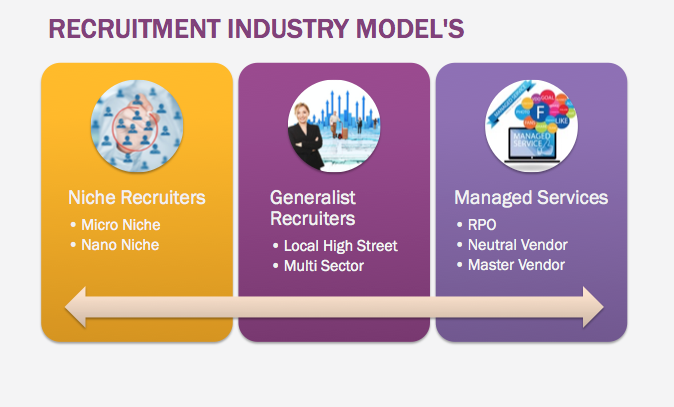
Niche Recruiters
The Niche model, in its various guises, leverages the numerous skills-gaps that exist in the UK and Global economies and has two drivers,
- Find the rare skilled candidates and gain a degree of exclusivity
- Sell the rare skilled candidates to the highest bidder
Niche recruiters have been the success story of the past 15-20 years and are dominated by SMEs. They leverage their status as niche sector experts and master their ability to find and secure any skill in that sector. It is fair to say most of our high growth agencies are all niche agencies.
Increasingly these niches are becoming narrower and deeper. The expression “inch wide, mile deep” has been used many times to describe them.
These agencies have become very effective at maximising their fees and making healthy returns.
Managed Service Recruiters
These operate at the opposite end of the market and work on volume and at a lower transaction price. They industrialise process and are constantly seeking productivity gains to driver down delivery costs, as well as increase their quality service thus generating extra profit.
The cost of acquisition of staff for their clients is constantly failing as they invest greater and greater sums in automation. AI and chat-bots greatly excite this sector as it gives them even further opportunities to increase productivity gains. It also raises the bar for the smaller operators as entry to this market becomes more complex and costly. That said this too might shift with automation. We will have to see.
These suppliers have become very effective at exploiting their clients employer brands as they become very effective “one-stop-shops”.
At the same time the agencies in this sector are seeing their market under attack from Clients In-sourcing strategies where In-House Teams take these contracts back inside and TUPE over the operational staff that are delivering these solutions.
Generalist Recruiters
Increasingly the directors of these businesses are moving their companies more towards operating as a collection of niche businesses under one-roof as they see their margins squeezed by the ever-aggressive Managed Services Businesses and as they struggle to provide expertise that the niche agency suppliers bring to bear.
In certain localities across the UK we see a future for these generalists if they focus on getting close to the SME business sector in their locality but in most locations I think they will struggle unless they specialise and move towards the niche model.
Key Reports
This is a dynamic landscape with new reports out each week but the key reports we focused in this blog are:
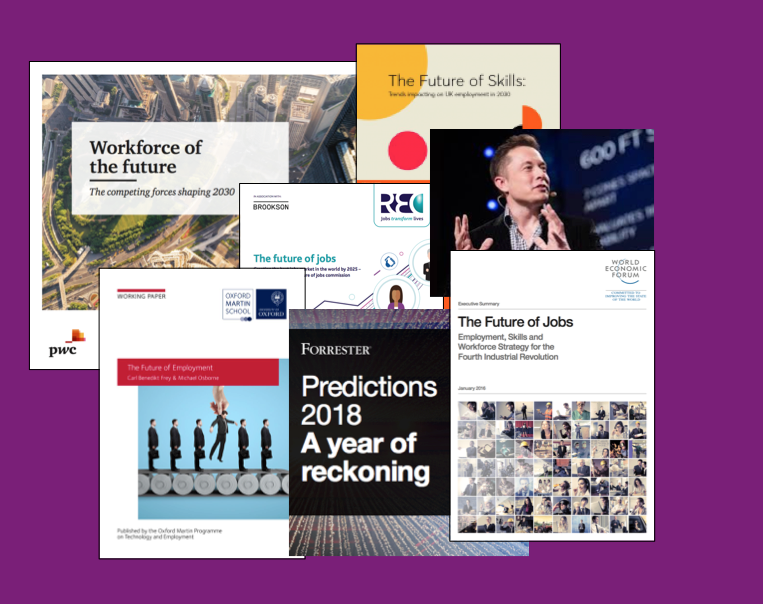
Key Headlines
The world of work and the future of recruitment is going to be a highly dynamic market and there is no overwhelming consensus on the cumulative effects of change as to what the future will look like.
There is general agreement however on some elements like what are the major technological dynamics that will affect the market:
- Automation
- Augmentation
- Artificial Intelligence
- Autonomous Vehicles
- 3D Printing
It should also be noted that there are other effects, which also feed into this market dynamic and these are:
- Longevity and ageing societies
- Changing Nature of Work, flexible working, remote working
- Climate change and natural resources
- Geopolitical volatility
- Consumer ethics and privacy issues
Automation
Automation affects employment in 2 ways:
Displacement Effect
- Negatively – by directly displacing workers from tasks they were previously performing.
- Tend to be low skilled roles
Productivity Effect
-
- Positively – by increasing the demand for labour in other industries or jobs that arise due to automation
- Tend to be high skilled roles
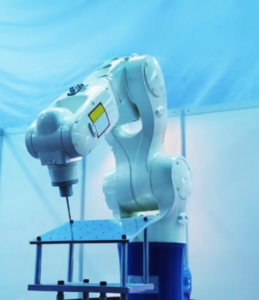
An analysis by Deloitte of ONS data suggests that the impact of automation is already being felt in sectors where a high proportion of jobs have a high chance of being automated. (Taken from REC – Future of Jobs).
In the UK most of the major jobs losses between 2001-15 have been in Manufacturing 720,000 with the largest number being created in Health and Social Care 1.1m.
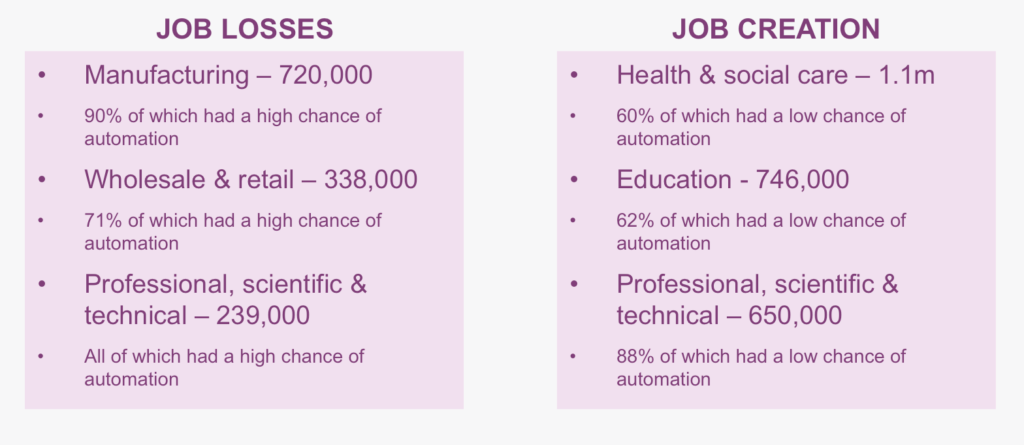
Interestingly Professional, Scientific and Technical appeared in the top three for both jobs lost and created. Deloitte’s analysis concluded that all of those lost had a high chance of automation whilst of those created 88% had a low chance of automation.
Augmentation
This is where technology is not replacing workers but supporting or augmenting their skills and performance to improve their effectiveness and efficiency.
A good example of how automation is augmenting healthcare jobs can be seen from the work of Prof. Paul Leeson of Oxford John Radcliffe Hospital and his colleagues who have developed a system that they claim could save £1.1 billions of pounds by enabling the heart diseases to be picked up much earlier.
The technology will start to be available to NHS hospitals for free this summer and Prof Paul Leeson –”Data indicates that the system had greatly outperformed his fellow heart specialists.” Of 60,000 heart scans carried out each year, 12,000 are reportedly misdiagnosed at an estimated cost of £600million.
This story appeared in a Daily Telegraph article in 3rd Jan 2018.
Artificial Intelligence
According to the Encyclopaedia Britannica :
Artificial intelligence (AI), the ability of a digital computer or computer-controlled robot to perform tasks commonly associated with intelligent beings. The term is frequently applied to the project of developing systems endowed with the intellectual processes characteristic of humans, such as the ability to reason, discover meaning, generalise, or learn from past experience.
This will remove a whole host of repetitive jobs across business and industry as can be seen later with the role of accountants and book keepers.
The World Economic Forum – Future of Jobs report, which looks at the 2015-2020 period and predicts which sectors are likely to see the most jobs losses.
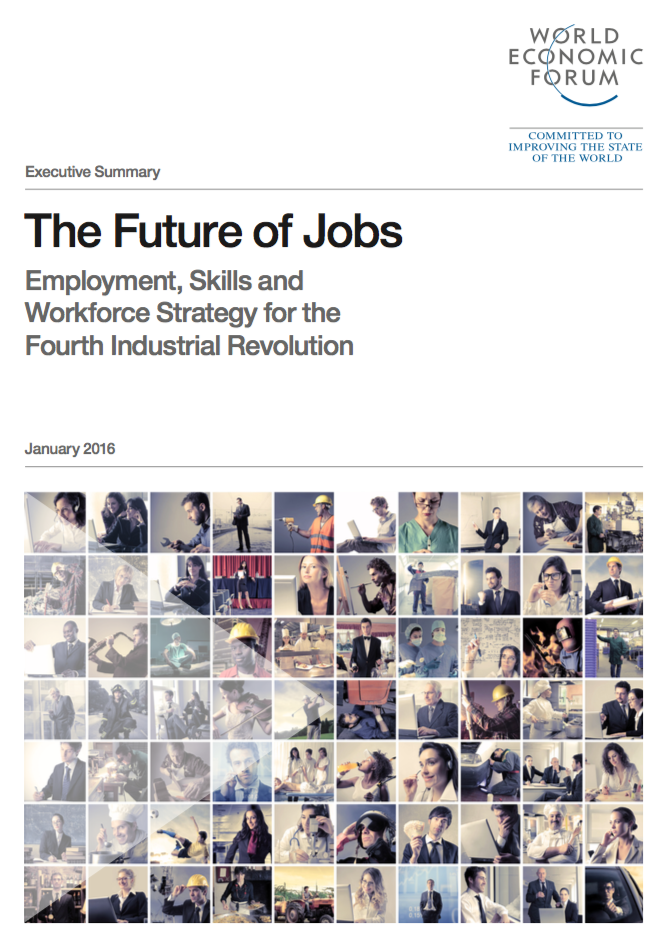
Again this report like the Deloitte report lists Manufacturing and Production jobs high up behind Office and Administrative jobs. This time it lists Education and Training and Sales Related jobs as being the least in danger of automation. Once again Professional Business and Financial Operations jobs along with Management roles featured amongst the lowest at risk of automation.
Finally the work of Frey & Osborne from Oxford Martin University has been heavily quoted by many commentators and an interactive graphic produced by Bloomberg enables readers and recruiters to enter a job type and see the likely risk of automation to the role. We’d encourage you to review key jobs that you recruit for to see their likely risk of automation over the next few years.
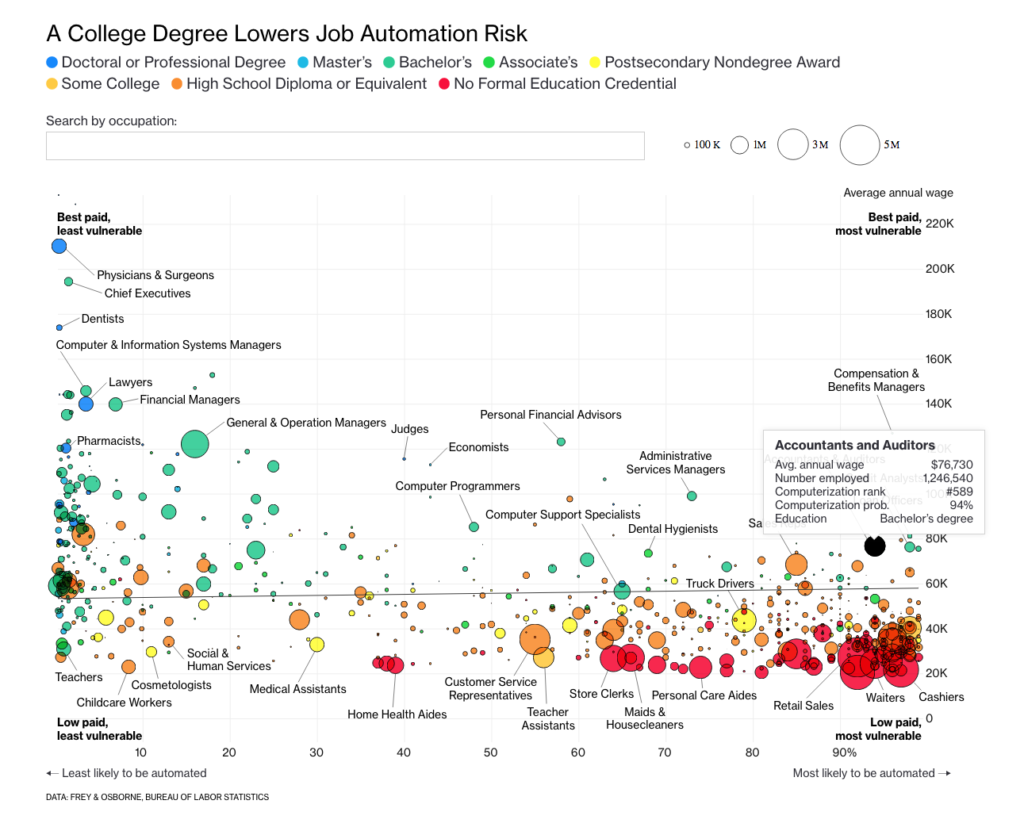
Bloomberg quote Frey & Osborne:
Researchers at the University of Oxford, for example, estimate ” that nearly half of all U.S. jobs may be at risk in the coming decades, with lower-paid occupations among the most vulnerable.”
Their graphic for example shows that Accountants and Auditor though well educated and well paid were at a 94% risk of their jobs being automated.
Whilst this has been questioned by many you only have to look at the accounting tools now available from Xero or Sage to understand how through AI and machine learning this can easily happen.
As one of Sage’s Top 100 Global Business Influencers I contacted their product development people to see if they had any thing they could offer me to help explain this and I am delighted to say they shared with us details on their chatbot Pegg.

Pegg:
“..is your smart, admin assistant that lives in your mobile, so you can record your expenses anywhere, anytime, without hassle or entering paper receipts.”
“Because of clever integration, simply message Pegg with your expenses and it automatically accounts for it in Sage One.”
With bank feeds now entering all your credit card and bank account transactions directly into Sage One and with rules on how expenses from specific suppliers are handled, the whole process of book-keeping and receipting your transactions can be simplified and semi-automated. It becomes very easy to see how with further AI this whole accounting process could be fully automated in the next 5-10 years.
In the UK Carl Frey, co-director of the Oxford Martin programme on technology and employment at Oxford University, estimates that as many as 35 per cent of jobs in the UK are at risk of loss.
The top ten of jobs most at risk of computerisation feature
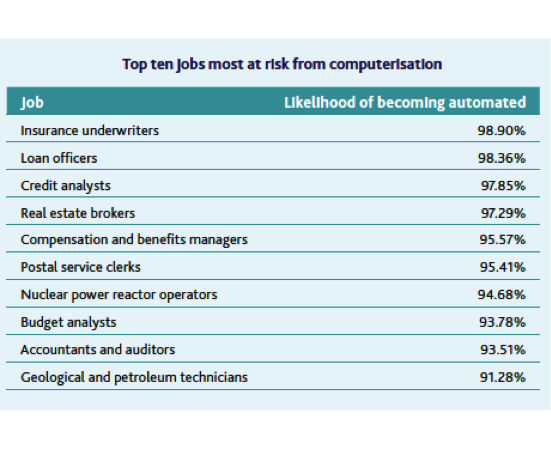
With the top ten jobs at least risk from computerisation being
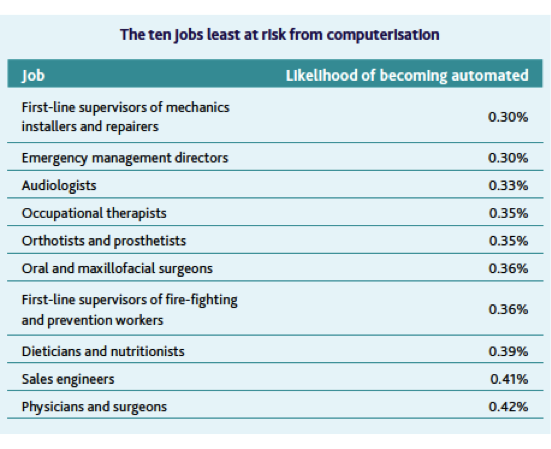
Autonomous Vehicles
Much has been said and written about this subject in recent months.
Elon Musk the CEO of Tesla Inc.claims totally autonomous vehicles will be on the roads in 2019 and they will be 10x safer than human drivers.
In November 2017 the UK Government announced Driverless cars will be on Britain’s roads by 2021 as a result of sweeping regulatory reforms that will put the UK in the forefront of a post-Brexit technological revolution as reported by the Guardian
And in the same months Volvo signed an agreement with Uber to supply them with tens of thousands of autonomous driving compatible base vehicles between 2019 and 2021..
Then in December 2017 Tesla launched their new “Semi-Truck” whose power and torque are vastly superior to all diesel engined vehicles.

What this means for employment in the transportation industry who knows as many working in the sector refuse to see any significant changes in the next 10 years. This nevertheless offers a huge opportunity for a disruptive business model so lets wait and see.
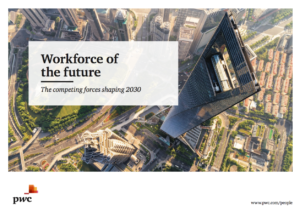
However the PWC UK Economic Outlook also estimate that transportation and storage (56%), manufacturing (46%) and wholesale and retail (44%) have the highest risk of automation the overall UK economy has a 30% risk of jobs being automated.
This compares very favourably with Germany 35% and the US 38%.
Human Qualities
Some of this discrepancy between the various reports can be explained by the unique qualities that we as humans have.
The reports are generally in agreement that the following are the human qualities that are the areas that machines will have difficulty automating:
-
- Emotional Intelligence
- Critical thinking
- Collaboration
- Emotional Support
- Original thought
- Abstract concepts
- Conflicting concepts
- Persuasion

The future is also not all bleak as clearly there are many new jobs being created. The IDC sees 2.1m jobs being created in the US by technology augmenting workers in the world of CRM over the five years to 2021.
AI has the potential to make many jobs more productive and remove a lot of the mundane and boring elements of jobs.
A key conclusion worth noting is how to protect yourself from unemployment which is listed as education.
The World Economic Forum estimates that those with GCSE2 have a 46% risk of losing their jobs whilst those with degrees are only at a 12% risk.
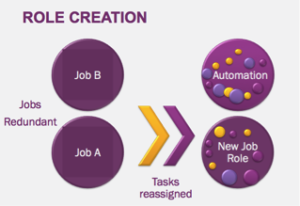
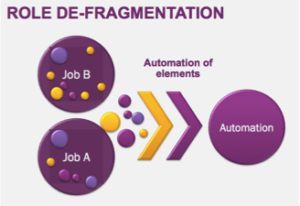
In fact the World Economic Forum’s Future of Jobs 2016 estimates that 65% of primary school children will end up working in jobs that don’t exist yet.
Future Scenarios
Part of the reason for the variation in predictions comes form the fact that there are a number of scenarios being considered.
There is a great Infographic from Salesforce, which illustrates this:

In the first scenario they call “False Alarm” new jobs emerge slows and current jobs are displaced slowly so nothing changes much. Personally I see this as the least likely of the four options.
The second scenario called “Jobs Crisis” has current jobs being displaced quickly creating unemployment and due to inertia, public sector intervention, private automation tax and heavy resistance to new technology new jobs are created slowly.
In the scenario called “New Economy” current jobs are displaced quickly and new jobs are created quickly. We would need to invest in training and retraining. For some this is exciting and dynamic but for many this would be too chaotic and could be very difficult for large parts of our society to cope with emotionally. This scenario if too rapid could see violent responses from some sections as well as huge increase in mental health issues for society.
The final scenarios “Labour Shortage” characterised by investment in training would see new roles created fast but traditional jobs displaced slowly. This would impact UK economic growth and could be catastrophic in the long run on our global competitiveness.
Personally I believe “Labour Shortage” and “New Economy” are the most likely scenarios and believe we will spend time potentially in both of these over the next 10-15 years.
Impact on Recruitment Process
As well as the sectors in which we supply and operate all this new technology will also impact the process of recruitment itself.
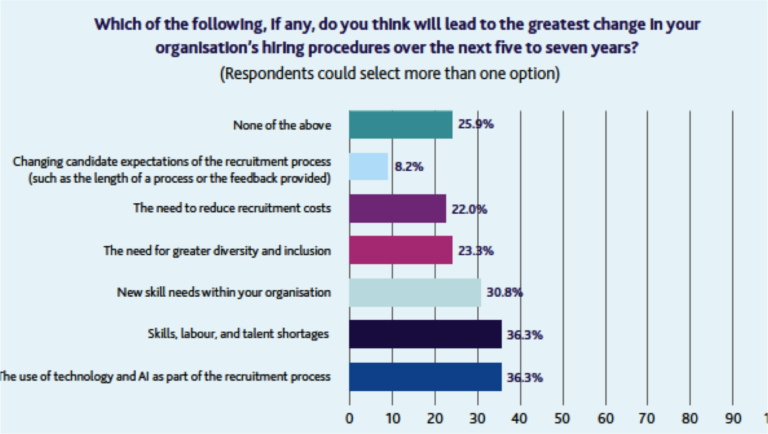
Source – Taken from REC – Future of Jobs
- AI – Will Increasingly be used to identify and sift candidates, for screening, compliance and skill verification
- Video Interviewing – Will become common as it removes geographic boundaries and speeds up the process
- Collaborative hiring – Tools to enable individuals to collaborate objectively in the process whilst operating in different geographic locations and time zones will become common, particularly amongst multi-nationals.
- Gamification – Technology to enable candidate testing during process
- New Resourcing Platforms – New ways of working to deliver efficiencies
All of these process changes and more will increasingly be used in the next 10-15 years. In many cases they will require high levels of capital investment taking them out of range of the SME Niche and Generalist Recruiters further adding ammunition to the armoury of the large MSP/RPO Recruiters enabling them to further penetrate the large corporate markets and drive down costs and increase profits.
In addition large corporates may choose to use these tools to insource these large contracts and deliver the efficiencies back into their own businesses.
The Consequences for future of recruitment
Threats to the future of your Recruitment Agency
If we reflect on the evidence that has been presented so far what we can conclude is that as well as destroying traditional job roles and job families the new technology will create new job roles and new job families of jobs.
As we have seen large numbers of roles are likely to disappear in transportation, manufacturing and wholesale/retail sectors. In addition some of the professional sectors will see many menial and semi-skilled roles automated. A lot of these roles will be the creation and preparation of data.
At the same time jobs will be created in health and social care sectors, education as well as highly skilled roles in the high tech, scientific, technical and professional sectors. Many of the professional, technical and scientific roles will be in the interpretation of data where there is often no clear right or wrong answer and it requires a careful balance.

The “Job-Crisis Scenario” discussed above presents a huge threat to recruitment agency businesses large or small with traditional jobs displaced quickly and new jobs created slowly. In this case we would see large-scale unemployment, which would be good for no one or any economy.
Another threat for many agencies would be huge market disruption that prevented consultants tracking where the skills-gaps were or being able to service them. It would also prevent employers businesses being able to plan and predict their future and would make recruitment highly volatile and uncertain which in turn would disrupt growth and economic expansion.
A highly dynamic situation where skills-gaps were created and disappeared too quickly would make the conditions almost impossible for niche consultants to develop their skills and deliver a high quality and reliable service to employers.
Finally another threat to all recruitment agencies would be if the dynamic changes disrupted long-standing customer relationships removing continuity and allowing their competitors to move in.
I am text block. Click edit button to change this text. Lorem ipsum dolor sit amet, consectetur adipiscing elit. Ut elit tellus, luctus nec ullamcorper mattis, pulvinar dapibus leo.
Opportunities in the future for your Recruitment Agency
In the opposite scenario “Labour Shortage”, where new jobs emerge quickly and current jobs are displaced slowly the opportunities for niche agencies to benefit will be huge. Significant opportunities would also exist for generalist or Managed Service Recruiters as well.

Also The “New Economy” scenarios would also create sizeable opportunities for recruitment agencies to thrive through servicing their clients needs by continuing to leverage their skills and expertise either as a niche recruiter, generalist or Managed Service Recruiter.
In-house recruiters in both scenarios would have a key role to play.
In situations where these skills gaps are created rapidly then highly skilled expert recruiters who know their niches well or have strategies to recruit at volume should prosper.
Such a dynamic market is likely to create situations where agencies with less agility or expertise could see their customer relationships disrupted or lost to agencies that are better able to respond to the rapidly changing market conditions.
It proffers the opportunities for some agencies, (niche, generalist or MSP/RPO) to strike up Strategic Partnerships with some employers who seek continuity of service and supply.
Finally it also creates a huge opportunity for all agencies to offer consultancy to employers on how to create new roles that can easily be resourced and build resilient resourcing strategies that help businesses deliver ambitious growth plans.
It does call for a different type of selling however. Agencies will need to learn “consultancy sales” skills as well as strategic relationship sales skills.
It may require different sales professionals to the ones currently employed by some agencies which some might find extremely challenging.
Conclusion
No one knows what will actually happen and to a degree there is still time for us to avoid many of these pitfalls and maximise the opportunities that this new industrial revolution will create for us as the recruitment community as well as society as a whole.
One thing however is certain and in the words of Bob Dylan,
The times they are a changing.
As recruitment agency owners, directors and talent leaders one thing you would be wise to do is not ignore what is happening and wait for the future to become clearer before acting.
The reason….because it may never be clear.
We are moving into a world of constant and dynamic change.
My advice to all our clients is monitor, observe and where you feel there is a clear shift respond to opportunities or mitigate any risks to your business.
This may mean:
- Diversify your niche sectors.
- Move form being a local generalist to being more niche focused.
- Recruit consultants who are more responsive to their clients and the market.
- Seek out employees that are more flexible and innovative.
- Build resilient client relationships.
- Review your business operating model.
- Reduce your office network.
- Change your CRM/Mid-office technology platform.
- Review your consultant recruitment and training strategy.
It may also mean in the medium term moving away form sectors such as:
- Logistics
- Warehousing
- Manufacturing
- Low/semi skilled temps
It could mean exploring sectors such as:
- Hi-Tech
- Health and Social Care
- Education
- Technical/Professional
The recruitment agencies that thrive and prosper in the next 15-20 years and therefore the entrepreneurs who go on to succeed will be the “fittest”.